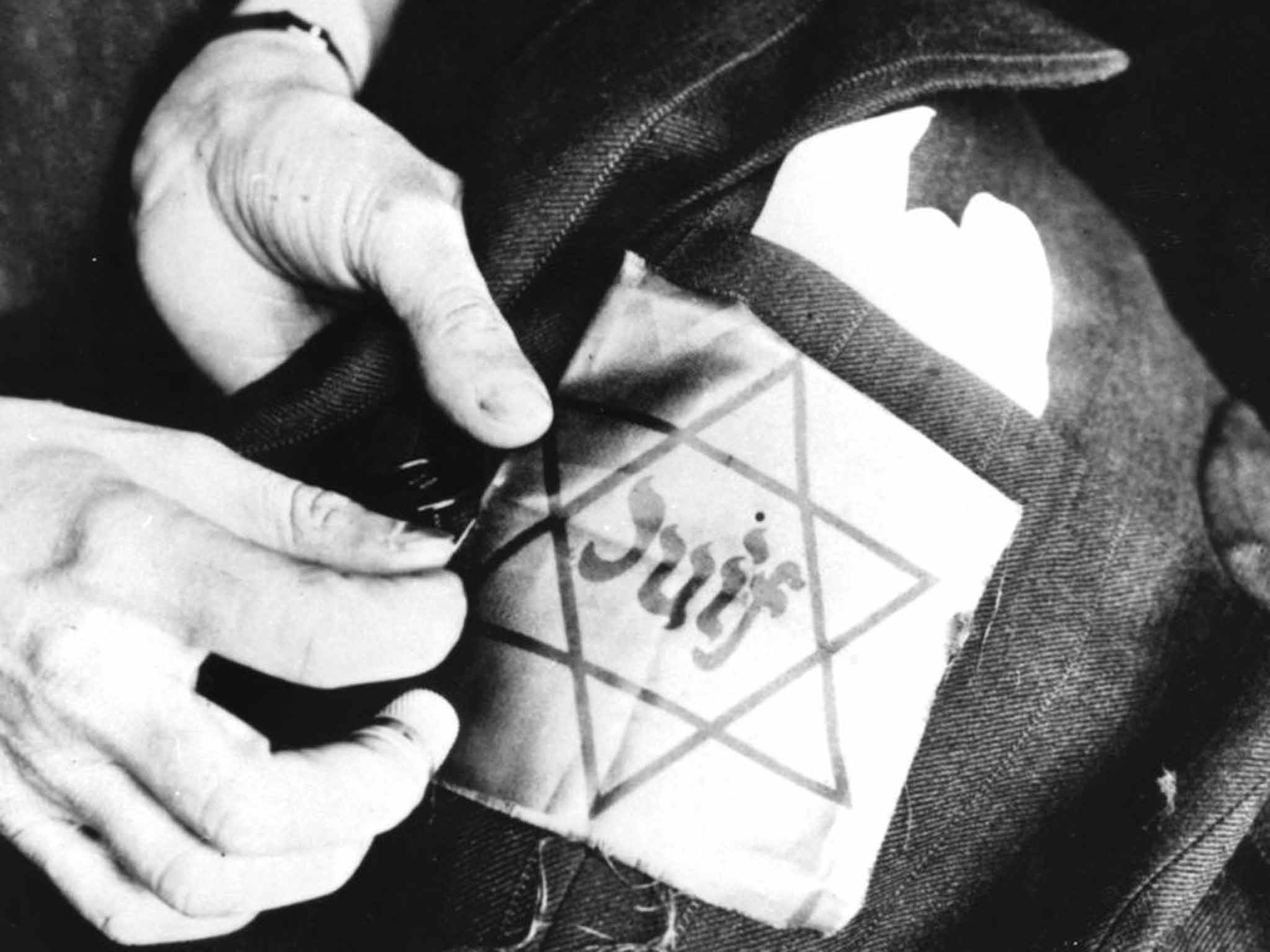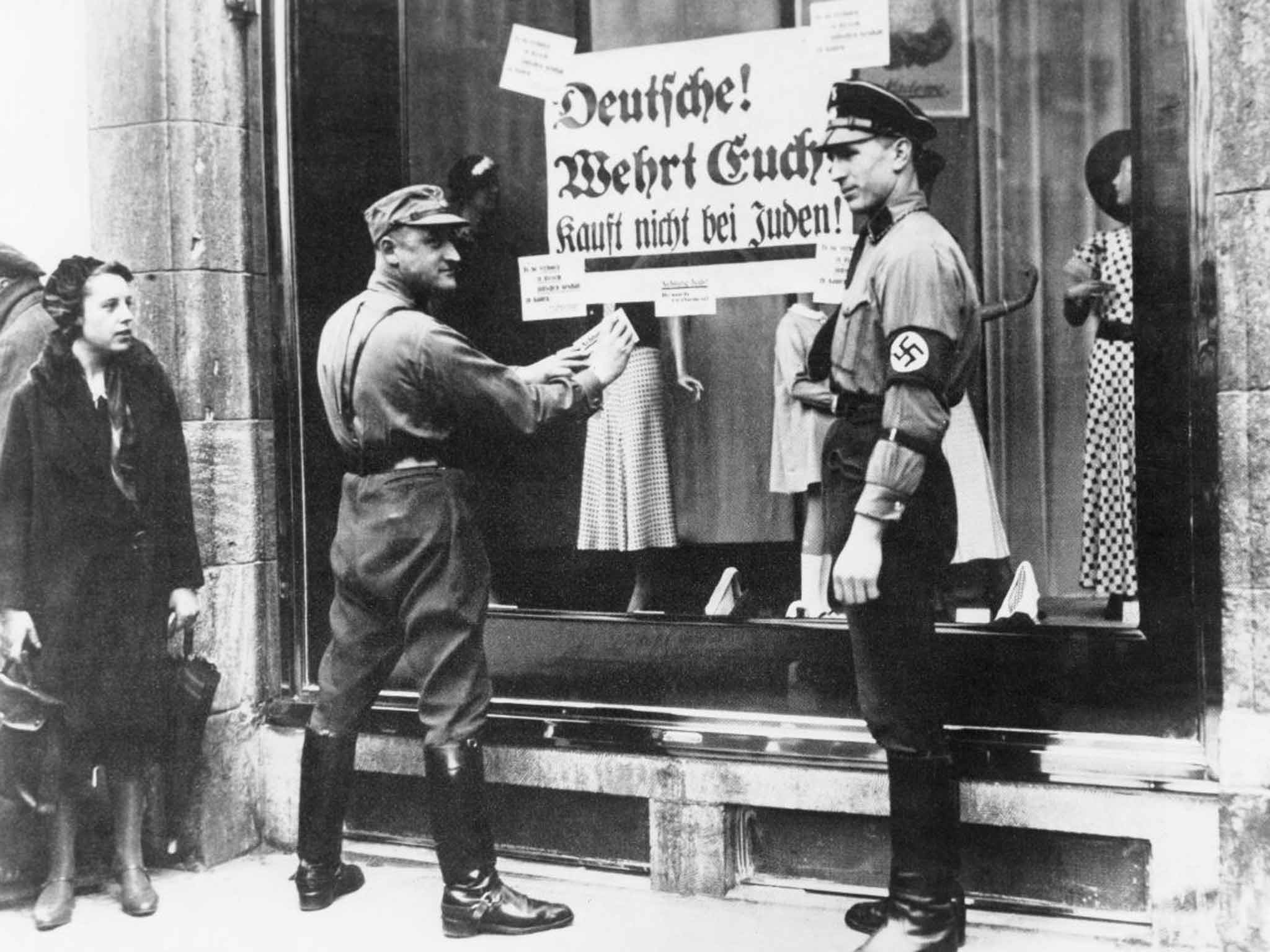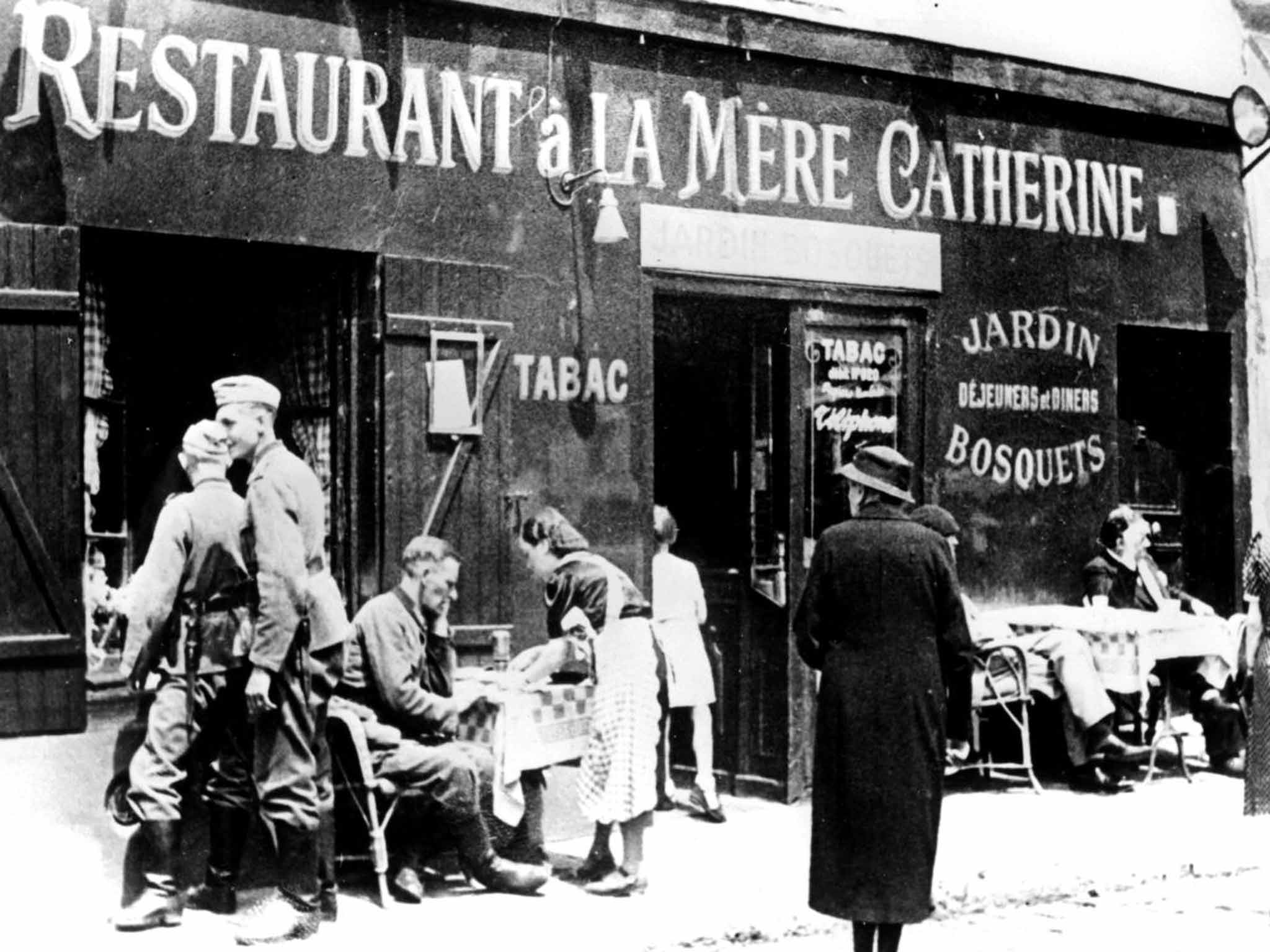Françoise Frenkel's escape from the Nazis and Vichy France: A bitter, beautiful and important book
Françoise Frenkel's book 'Rien où poser sa tête' has been rescued from obscurity. Robert Fisk celebrates an extraordinary writer, and her story which has a mystery at its heart.

The mysterious Françoise – that is what French writers now call the young Jewish bookseller from Poland who wrote an equally mysterious book about her flight from the Nazis and the Pétainists and the milice (militia) in Vichy France after 1940, and about her desperate and ultimately successful attempt to escape the Auschwitz deportation trains and reach neutral Switzerland. To describe the book as powerful is an insult to Françoise Frenkel. It is written in abrupt, shocking yet delicate prose, cruelty and beauty combined in just over 250 pages, the wickedness of Nazi Germany – both its cancerous effect and heroic reactions among the soon-to-be occupied French – a constant, over-your-shoulder terror.
It's easy to compare Frenkel's book with the never-to-be-completed Tolstoyan epic of German occupation written by Irène Némirovsky, the Russian-born Jew who, unlike Frenkel, was sent to her death in Auschwitz in 1942, her Suite Française now printed in many languages and acknowledged as a masterpiece of 20th century literature. Alas, Frenkel's nail-biting, sorrowful account of her travails – the French are already calling it “Fuite Française” (roughly, “in flight from France”) – has spent the past 70 years in a darkness as mysterious as the author's life.
It is known that she died in Nice on 18 January 1975, but no photographs or letters exist. Only her book, which she titled Rien où poser sa tête (“No Place to Lay Her Head”) remains, first published in a tiny edition in Geneva in September 1945 – it received just one brief review in a Swiss feminist publication the following year – and only rediscovered in an attic in southern France in 2010.
The book's new publishers, Gallimard in Paris, say that they cannot even trace Frenkel's legal heirs. But far more mysterious is the complete absence in these pages of her husband Simon Raichenstein. He was detained in a French police raid in Paris in July 1942, was sent to the Drancy camp on the 24th of the month and died in Auschwitz on 19 August of that year. The book covers this period in great detail – but there is no mention of him.
Exactly a week after his murder – which Frenkel could not have known about then, although surely she knew of his arrest the previous month – she is writing almost blithely of her precarious life as a hunted Jew in Nice. “On 26 July, as usual, I was doing my grocery rounds,” she writes. “Despite the early morning, it was very warm, but I was astonished to see so few people at the market. When I'd finished shopping, I went quietly back to my hotel. But on turning the corner of the street next to my home, I looked up as usual towards the fourth floor to wave to my Viennese neighbour. This morning, she wasn't there. On the other hand, I spotted on a third floor balcony a fellow-Pole, Mr Sigismond. He waved both his arms as a warning. I thought he was being humorous, but I quickly realised he was signaling to me.”

Frenkel follows the direction of his hands, turns into the next street and finds Vichy French police and trucks. “Then came policemen who were pushing in front of them – or holding by their arms – men, women and children. 'What's going on?' I asked a lorry-driver. 'They're picking up the Jews,' said several voices at the same time.” Frenkel walks away, marching “mechanically” towards the sea, then sits on a park bench facing the Mediterranean, her food-basked at her feet, lost in thought.
She even walks back to the dangerous street full of gendarmes – readers must hold their breath – and feels a sensation of both crazed heroism and utter failure. “For a moment, the temptation came to me to run towards the crowd and cry out: 'Take me away too, I am one of theirs.' A feeling of intense happiness overwhelmed me at this thought of solidarity and self-sacrifice. But cold logic took over. What would be the use of such a sacrifice? What could it alter? What good would it do? Self-preservation overwhelmed me. The bitterness of this truth weighs heavily upon me now and will continue to do so until the end of my days.”
Was Frenkel writing three years later when she must have known of Simon's fate, absolving herself of her husband's death? She refers often to “my family”, some of them in occupied Belgium, but never specifically to Simon. From the very first pages, when 32-year-old Françoise opens a shop for French books in Berlin after the First World War, we know Simon is with her. We also know that in November 1933, 10 months after Hitler came to power in Germany, he went into self-exile in France, leaving his wife to face on her own the increasingly oppressive restrictions of the Nazis for the next six years. She herself fled to Paris a few days before the Second World War broke out. Again, there is no word of Simon in her book. She must have seen him in Paris. Before the German army reached the city in 1940, she flees again, this time for the south of France. Did Simon travel with her, only to return – fatally – to German-occupied Paris? Again, we do not know, and perhaps never shall.
Nobel Prize winner Patrick Modiano, who wrote the preface to the new edition of Rien où poser sa tête, has said that if Françoise Frenkel had not existed, he would have written a novel about her. The uniqueness of her book, he said, was that the author could not be precisely identified. “I prefer not to know what Françoise Frenkel looked like, nor the events of her post-war life, nor the date of her death,” he said. “And so her book will live with me forever as a letter from an unknown person, a forgotten piece of mail that you received in error, it seems, but one that you were perhaps destined to be given.”
This is romantic reaction to this book, but not, I fear, a sensible one. In the crazed world of Holocaust deniers, it's not difficult to see how antisemites might take advantage of our scant knowledge of Frenkel's life. Yet the basic facts of her precarious existence in Vichy France are accessible: the Arche de Noe hotel, in which she lived (and hid) from February 1941 to 26 August 1942 – the date on which Mr Sigismund saved her life with the warning wave of his arm – still exists (now called La Roserie), her safe house at 12 rue Saint-Philippe (“Marius – Salon de Coiffure”) is printed in the 1941 phone book. And we have the 1959 German government document showing that, when staying in post-war Berlin, she received 4,500 Deutschmarks in recompense for her personal property in Paris, looted by the Gestapo in 1942 (the Gestapo document of seizure, thanks to characteristic Teutonic thoroughness, was also on file and dutifully recovered).

But her own beautifully written account of her fear and resourcefulness in Vichy France is proof enough of the veracity of her book, her existence, her pain and the stomach-churning fear of betrayal. Françoise Frenkel fights against a world of fascist bureaucracy, her original French laissez-passez – awarded in 1939, partly for her services to French literature in pre-war Berlin – is invalidated by the Vichy regime, and she squeezes from the police new identity papers that do not mention – at first – her Jewish race. She tries three times to reach Switzerland, is captured by the French – German military personnel are also at the border – and only finally breaks through to Switzerland under fire and tumbles down a hillside in snow and fear into the arms of a young Swiss soldier while her Swiss visa is still – just – valid.
Any Arab who has endured the torture of dictatorial bureaucracy in the Middle East should understand Frenkel's terrifying interrogation – the arrogance and occasional kindness of French officials – as she seeks yet more identity papers to keep her alive and unarrested. And refugees risking their lives in the Aegean sea to reach Europe today would surely comprehend her relief when she lies in the snow by the border wire and is told by the Swiss soldier: “Get up, Madame, you're not wounded. See, you are in Switzerland.”
Frenkel never despairs of humankind. She writes with pity and disgust about the French who would betray her, with love and warmth about the people of Savoy who spoke of the goodness of France and their determination to save her. A couple who own a restaurant risk their lives repeatedly to protect her and to extract her from the hands of the Vichy authorities. Remarkably, when captured and put before a French court for illegally trying to cross the French frontier to Switzerland – the irony, of course, is that the Vichy French would have been happy for her to cross their border en route to Auschwitz – Frenkel writes with agony not of herself but of a Jewish man facing the same judge.
He had been caught on the way to Switzerland: he killed his wife in a suicide pact when they were arrested, but only wounded himself. Yet when the French police tried to take him to the nearest hospital, the local French mayor refused to allow a Jew to be treated by the town's medical authorities. He was carted many more miles for treatment. Lawyers persuaded the court judge that the poor man had suffered enough and he was freed.
And amid this torment, Frenkel writes about the brilliance of the snow, the sunlight in the trees of southern France and the magnificence of the medieval walls and streets of remote villages where she seeks shelter. There are moments when paragraphs of her book might be used in a modern tourist guide to the countryside of Nice, Annecy and Avignon. But the terror of deportation lies like a blanket over the Jews hiding in Vichy France.
As the round-up of Jews continued, Frenkel writes: “The number of those fleeing was greatly reduced. Worn out by their ordeals, weakened by their long time in hiding and by the apathy it induced in them, the refugees lost all their energy. Avoiding arrest became such an enormous undertaking that it appeared to be no longer worth the risk. They resigned themselves to wait passively for their fate, giving up both their plans and their hope at the same time. A few brave people, on their own – above all, the young – preferred to confront whatever danger awaited them. They would leave, carrying...weapons or – in case of failure – sufficient poison to kill themselves in case of arrest.”
It is no wonder that Frenkel's book is both passionate and bitter: it is also a literary account of human folly, written by a woman who loved French literature all her life. She studied at the Sorbonne, was an intern at a French bookshop and then decided to devote her years to reading and selling French books. She recounts how visitors to her Berlin bookshop included Henri Barbusse, Colette, André Gide and André Maurois.
She was probably familiar with the early novels of Irène Némirovsky – but since Suite Française was only read for the first time in manuscript by Némirovsky's daughter Denise in 1975, Frenkel could never have known of this, her greatest work. Némirovsky was deported to Auschwitz and died in a gas chamber on 17 August 1942, two days before Frenkel's husband Simon was put to death in the very same Nazi extermination camp. Némirovsky's husband died at Auschwitz less than four months later. Her small daughters, Denise and Elizabeth, survived, hidden by a local French teacher. In Suite Française, a French woman falls, however briefly, in love with a German soldier. No such sentiment touches Frenkel's book.
But not long after Suite Française was published, I wrote about this extraordinary book in The Independent: Némirovsky wanted it to be a modern-day War and Peace – and nine years ago, I received a gentle letter from her now elderly daughter, Denise Epstein. “Allow me to present myself,” she wrote. “I am the girl of Irène Némirovsky and I wanted to thank you for having spoken so well about my mother.” Denise castigated a French embassy official in Beirut who had, incredibly, chided me for writing about the French treatment of Jews during the Second World War.
“This book [Suite Française] caused a certain awakening of consciences undoubtedly but...I realise that the memory is really diluted very easily and which that [sic] opens the door with other massacres innocent [sic] whatever their origin...I am now 77 years old and I nevertheless live the every day with the weight of this past on the shoulders, softened by happiness to see reviving [the memory of] my parents, and at the same time as them, I hope to make revive all those of which nobody any more speaks. PS: Sorry for my bad English!”
I believe that Denise would have wanted to read Françoise Frenkel's book, but she died almost three years ago. Rien où poser sa tête is a counterpoint to her mother's brilliance.
'Rien où poser sa tête' is published by Gallimard
Join our commenting forum
Join thought-provoking conversations, follow other Independent readers and see their replies
Comments